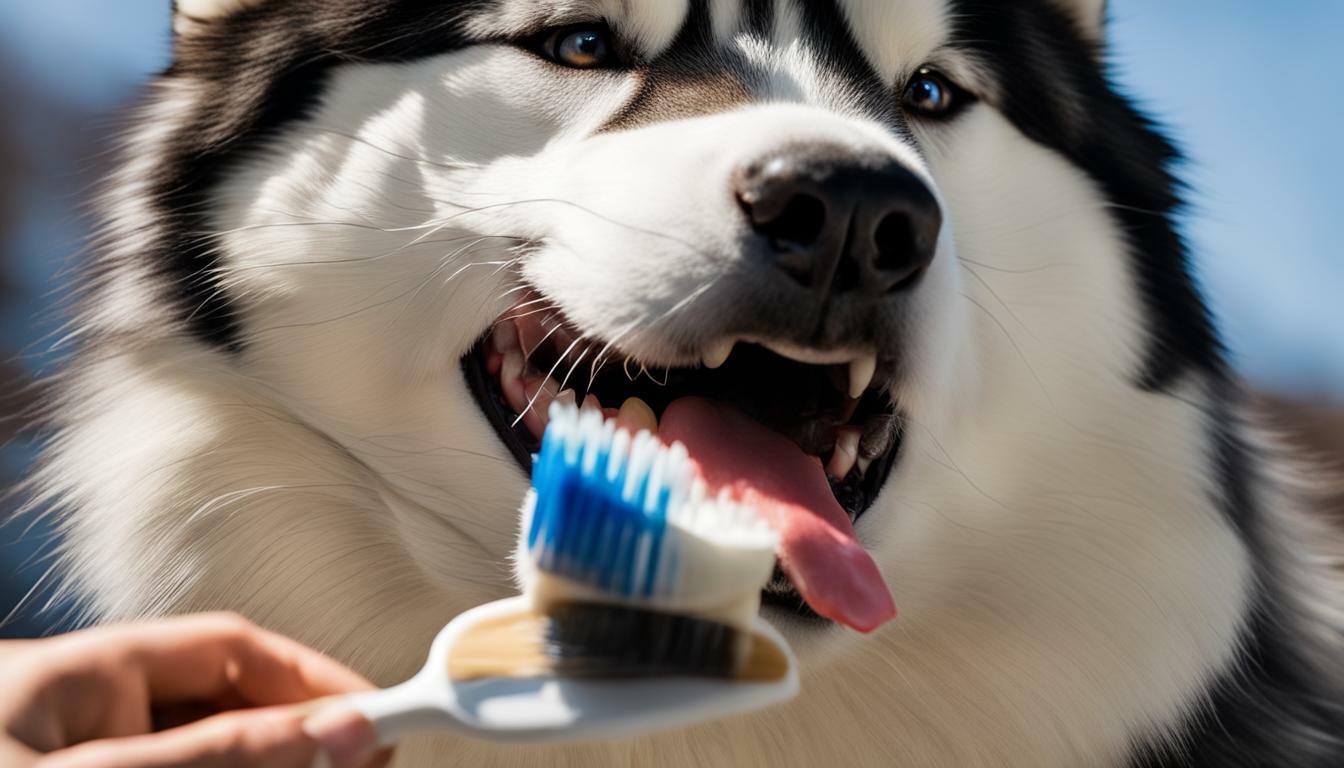Taking care of your Alaskan Malamute’s dental health is crucial for their overall well-being. Just like humans, dogs require regular dental care to maintain good oral hygiene. In this ultimate guide, we will provide you with essential information and tips on how to clean your Malamute’s teeth effectively.
Alaskan Malamutes are more prone to dental issues compared to other breeds, making dental care even more important. Neglecting their oral health can lead to serious diseases, such as periodontal disease, which can be painful and result in expensive veterinary procedures.
Starting a teeth cleaning routine early is key to ensuring your Malamute’s dental health. Introduce them gradually to the process, making it a positive experience for both of you. By establishing a regular teeth cleaning routine, you can prevent potential dental problems and identify issues such as cracked molars or objects stuck in their teeth before they become more severe.
To effectively clean your Malamute’s teeth, you’ll need the right tools. Use a dog toothbrush and toothpaste specifically designed for dental care in dogs. Brush their teeth daily or as often as possible, and consider incorporating dental treats into their diet. These treats not only provide a tasty reward but also contribute to their oral health.
If you are unsure about tackling your Malamute’s dental care on your own, professional dental cleaning is an option to consider. A veterinarian will be able to perform a more thorough cleaning and provide additional treatments if necessary.
While regular teeth cleaning is essential, maintaining your Malamute’s oral health goes beyond brushing. Incorporate dental chews into their routine and provide them with a high-quality diet that promotes good oral hygiene.
It’s important to be aware of other considerations for your Alaskan Malamute’s health. They may be genetically predisposed to certain conditions such as hip dysplasia, dwarfism, bloat, peripheral neuropathy, thyroid problems, and eye problems. Regular veterinary check-ups and addressing these concerns early can help ensure their overall well-being.
In addition to their physical health, don’t forget about your Malamute’s activity and socialization needs. Regular exercise and proper socialization are crucial for their mental well-being.
In conclusion, by following the guidelines in this ultimate guide, you can maintain your Alaskan Malamute’s dental health and contribute to their overall well-being. Remember, prevention is key, and a healthy smile leads to a happy dog!
Why Dental Care is Important for Alaskan Malamutes
Alaskan Malamutes are more prone to dental issues, making regular dental care an essential part of their overall health routine. Dental problems can lead to serious diseases, such as periodontal disease, if left untreated. It is crucial to prioritize their oral health to ensure they live a happy and healthy life.
Periodontal disease is a common dental problem in dogs, and Alaskan Malamutes are particularly susceptible to this condition. The buildup of plaque and tartar can lead to gum inflammation, tooth decay, and even tooth loss. By implementing a regular teeth cleaning routine, you can prevent these issues and maintain your Malamute’s oral hygiene.
Regular cleanings not only help in preventing dental diseases, but they can also identify other problems early on. Cracked molars or toys stuck in teeth can cause discomfort and pain for your furry friend. By detecting these issues during routine cleanings, you can address them promptly and prevent further complications.
Investing time and effort in dental care for your Alaskan Malamute can save you from costly dental procedures in the long run. By making teeth cleaning part of your Malamute’s daily routine and providing them with dental treats, you can help maintain their oral health and prevent potential dental issues.
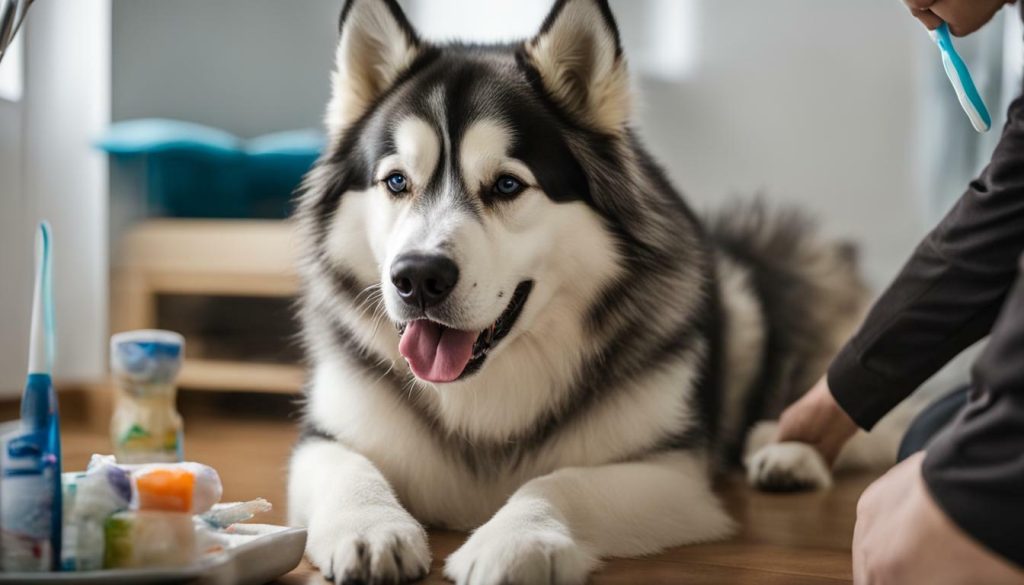
Starting a Teeth Cleaning Routine for Your Malamute
Introducing a regular teeth cleaning routine for your Alaskan Malamute can be made easier by starting the process early and making it a positive experience. Dental care is crucial for maintaining your Malamute’s oral health and preventing dental issues down the line. By establishing a teeth cleaning routine, you can help keep their teeth clean and their breath fresh.
To begin, it’s important to use the right tools. Invest in a dog toothbrush and toothpaste specifically designed for dogs. These products are formulated to be safe for your Malamute, and their bristles and flavors are tailored to suit their needs. This will make the brushing process more comfortable for them.
When starting the routine, take it slow and be patient. Your Malamute may not be immediately comfortable with having their teeth brushed. Begin by gently touching their gums and teeth with your finger, gradually introducing the toothbrush. Use positive reinforcement and rewards to make it a positive experience for them. Over time, they will grow accustomed to the process, and it will become a normal part of their routine.
Remember to brush their teeth regularly, ideally daily or at least several times a week. This will help prevent the buildup of plaque, tartar, and bacteria that can lead to dental issues. Additionally, consider incorporating dental treats into their diet. These treats are designed to promote oral hygiene and can help supplement their teeth cleaning routine.
By establishing a teeth cleaning routine, using the right tools, and making the experience positive, you are setting your Alaskan Malamute up for a lifetime of good oral health. Taking care of their teeth not only helps prevent dental problems but also contributes to their overall well-being. Start early, be consistent, and enjoy the bonding time that teeth cleaning can bring to you and your furry friend.
| Key Tips for Starting a Teeth Cleaning Routine: | |
|---|---|
| Start early: | Introduce teeth cleaning when your Malamute is young to establish a routine. |
| Use the right tools: | Invest in a dog toothbrush and toothpaste designed for dogs. |
| Take it slow: | Gently introduce the toothbrush and use positive reinforcement. |
| Brush regularly: | Brush your Malamute’s teeth daily or several times a week for optimal oral health. |
| Consider dental treats: | Supplement their routine with dental treats to promote oral hygiene. |
“Taking care of your Malamute’s teeth is an essential part of their overall health. By starting a teeth cleaning routine early and making it a positive experience, you can ensure that their teeth stay clean and healthy. Remember to be patient, use the right tools, and establish a regular brushing schedule. Your Malamute will thank you with a happy, healthy smile!”
Tools for Cleaning Your Malamute’s Teeth
Using the right tools is crucial for effectively cleaning your Malamute’s teeth and maintaining their dental health. Just like humans, dogs need regular dental care to prevent dental issues and promote good oral hygiene. Here are the essential tools you’ll need to keep your Malamute’s teeth clean and healthy:
1. Dog Toothbrush
A dog toothbrush specifically designed for dogs is essential for cleaning your Malamute’s teeth. These toothbrushes have bristles that are softer than human toothbrushes and are shaped to fit comfortably in your dog’s mouth. Look for a toothbrush with a long handle to make it easier to reach those back teeth. It’s important to use a toothbrush specifically made for dogs to avoid causing any discomfort or pain to your furry friend.
2. Dog Toothpaste
Using toothpaste formulated for dogs is crucial as human toothpaste can be harmful if ingested by dogs. Dog toothpaste comes in various flavors that are appealing to dogs, making the teeth cleaning process more enjoyable. These toothpastes are safe to swallow, so you don’t need to worry about rinsing your dog’s mouth after brushing. The toothpaste helps remove plaque and tartar buildup, freshens breath, and promotes healthy gums.
3. Dental Treats
Dental treats are a great way to supplement your Malamute’s oral hygiene routine. These treats are designed to promote teeth cleaning by reducing plaque and tartar buildup. They often have a chewy texture that helps remove plaque as your dog chews, and some are even infused with ingredients that freshen breath. Dental treats can be a tasty and beneficial addition to your Malamute’s dental care regimen.
| Tools for Cleaning Your Malamute’s Teeth |
|---|
| Dog Toothbrush |
| Dog Toothpaste |
| Dental Treats |
Using the right tools, such as a dog toothbrush, toothpaste, and dental treats, is essential for properly maintaining your Malamute’s dental health. Regular dental care and cleanings are vital to prevent dental issues and ensure your furry friend’s overall well-being.
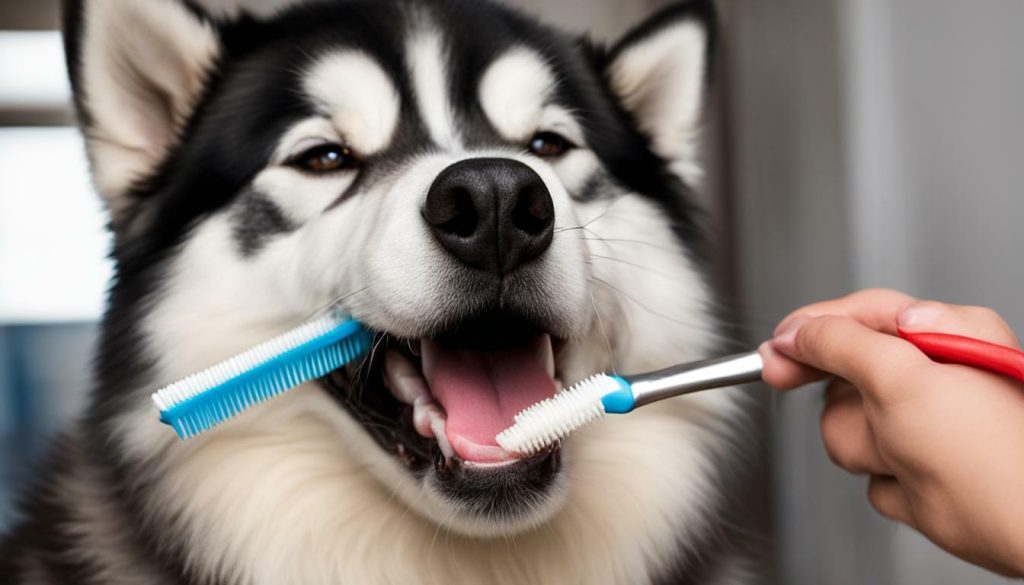
Regular dental care and cleanings are vital to prevent dental issues and ensure your furry friend’s overall well-being.
Step-by-Step Guide to Cleaning Your Malamute’s Teeth
Follow this step-by-step guide to ensure a thorough teeth cleaning routine for your Alaskan Malamute. Regular dental care is crucial for their overall health and can help prevent serious dental issues, such as periodontal disease.
1. Start by introducing your Malamute to the process gradually. Begin by gently touching their muzzle and lifting their lips to get them accustomed to having their teeth examined. Reward them with praise and treats to create a positive association.
2. Use a dog toothbrush and toothpaste specifically designed for dogs. Never use human toothpaste, as it can be harmful to your Malamute. The toothbrush should have soft bristles and a long handle for easy reach.
3. Brush your Malamute’s teeth daily, or as often as possible. Start by focusing on the outer surfaces of their teeth, using gentle circular motions. Gradually work your way to the inner surfaces and along the gum line. Be patient and take breaks if needed.
| Dental Care Tips: |
|---|
| • Feed dental treats that help reduce plaque and tartar buildup. |
| • Consider professional dental cleaning once a year to remove stubborn plaque and ensure optimal oral health. |
| • Provide dental chews to help keep their teeth clean and strong. |
Remember, consistency is key when it comes to maintaining your Malamute’s oral health. By following this step-by-step guide and incorporating regular dental care into your pet’s routine, you can help keep their teeth and gums healthy, preventing dental issues and promoting their overall well-being.
“Dogs are not our whole life, but they make our lives whole.” – Roger Caras
Summary
In summary, cleaning your Alaskan Malamute’s teeth is essential for their dental health. By starting a routine early, using the right tools, and brushing daily or as often as possible, you can help prevent dental problems and identify any issues that may arise. Feeding dental treats, considering professional cleaning, and providing dental chews and a high-quality diet can further contribute to their oral health. Remember to also consider their activity and socialization needs, as well as being aware of common genetic predispositions for health conditions. By taking a proactive approach to your Malamute’s dental care, you are ensuring their overall well-being and happiness.
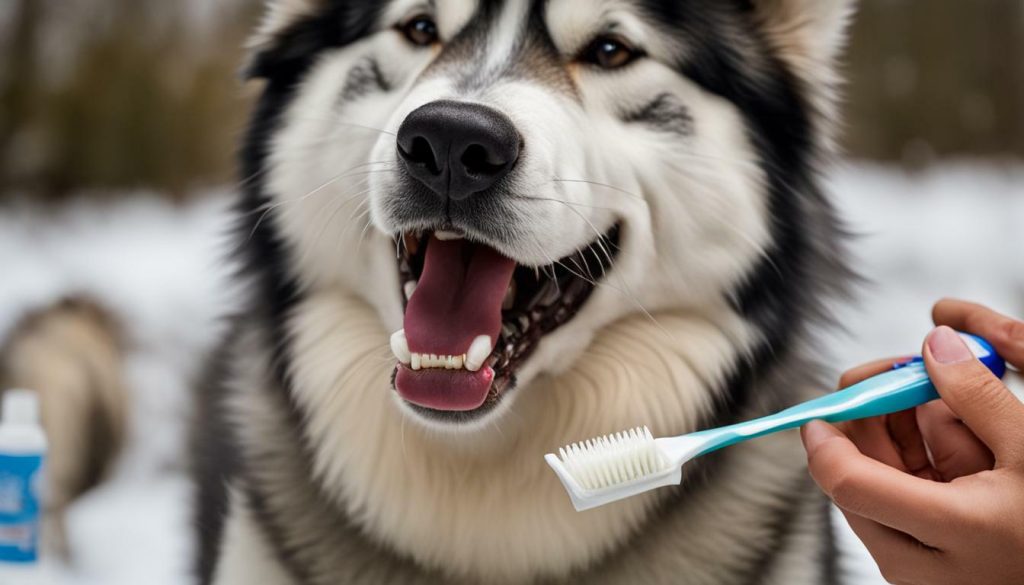
Professional Dental Cleaning for Malamutes
In addition to regular at-home teeth cleaning, professional dental cleaning can be beneficial for your Malamute’s overall oral health. While at-home cleaning helps to maintain good dental hygiene, professional cleanings provide a deeper and more thorough cleaning that can help prevent potential dental issues.
Professional dental cleaning for Alaskan Malamutes involves a comprehensive examination of your dog’s teeth and gums by a qualified veterinarian. They will use specialized tools and techniques to remove plaque and tartar buildup, which can be difficult to tackle with at-home brushing alone. This thorough cleaning can help prevent the onset of periodontal disease and other dental problems that can lead to serious health issues.
During a professional dental cleaning, your Malamute will be under anesthesia to ensure their safety and comfort. This allows the veterinarian to perform a thorough examination and cleaning without causing any stress or discomfort to your furry friend. They will also be able to identify any potential dental issues, such as cracked molars or toys stuck in teeth, and take the necessary steps to address them.
| Benefits of Professional Dental Cleaning for Malamutes: |
|---|
| Thorough cleaning to remove plaque and tartar buildup |
| Prevention of periodontal disease and other dental problems |
| Identification and treatment of potential dental issues |
| Safe and comfortable experience for your Malamute |
| Improved overall oral health and well-being |
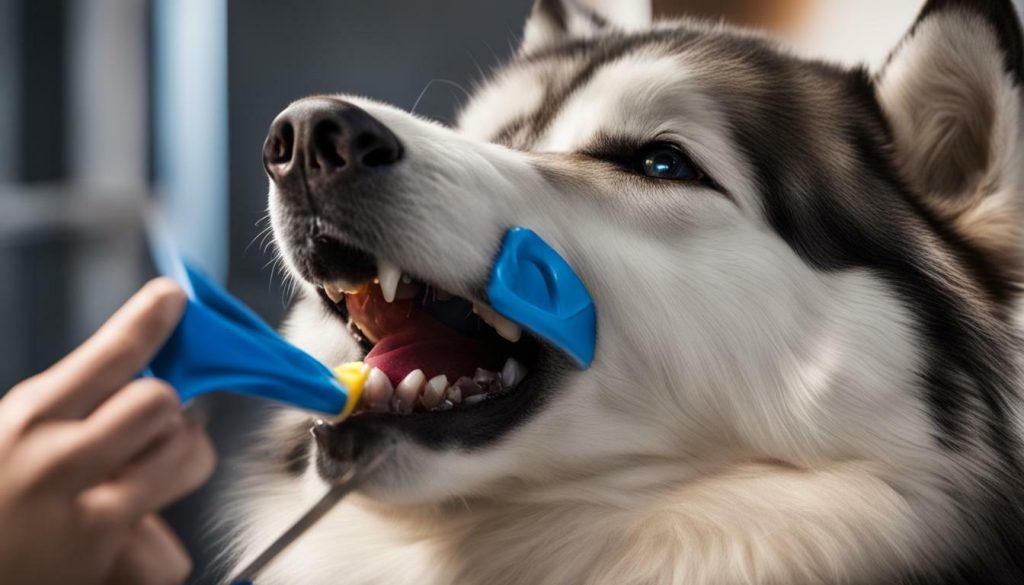
It’s important to consult with your veterinarian to determine the frequency of professional dental cleanings for your Malamute. Factors such as age, overall dental health, and individual needs will be taken into consideration to ensure the best approach for your dog’s oral care.
By combining regular at-home teeth cleaning with professional dental cleanings, you can provide your Alaskan Malamute with the comprehensive dental care they need to maintain optimal oral health for a lifetime.
Maintaining Your Malamute’s Oral Health
In addition to regular teeth cleaning, there are other measures you can take to maintain your Malamute’s oral health. Dental chews and a high-quality diet play a crucial role in promoting good oral hygiene. Dental chews are specially designed to help remove plaque and tartar buildup, keeping your Malamute’s teeth clean and healthy. Incorporating dental chews into their daily routine can provide an enjoyable chewing experience while supporting their dental health.
Another important aspect of maintaining your Malamute’s oral health is ensuring they have a high-quality diet. Feeding them a balanced and nutritious diet can contribute to strong teeth and gums. Look for dog food that is specifically formulated to support dental health, such as options that contain ingredients like antioxidants, vitamins, and minerals for optimal oral care.
Additionally, regular check-ups with your veterinarian are essential for monitoring your Malamute’s oral health. Your vet can assess their dental condition, detect any potential issues early on, and recommend necessary treatments. By staying proactive and taking these extra steps, you can help ensure that your Malamute maintains a healthy and happy smile for years to come.
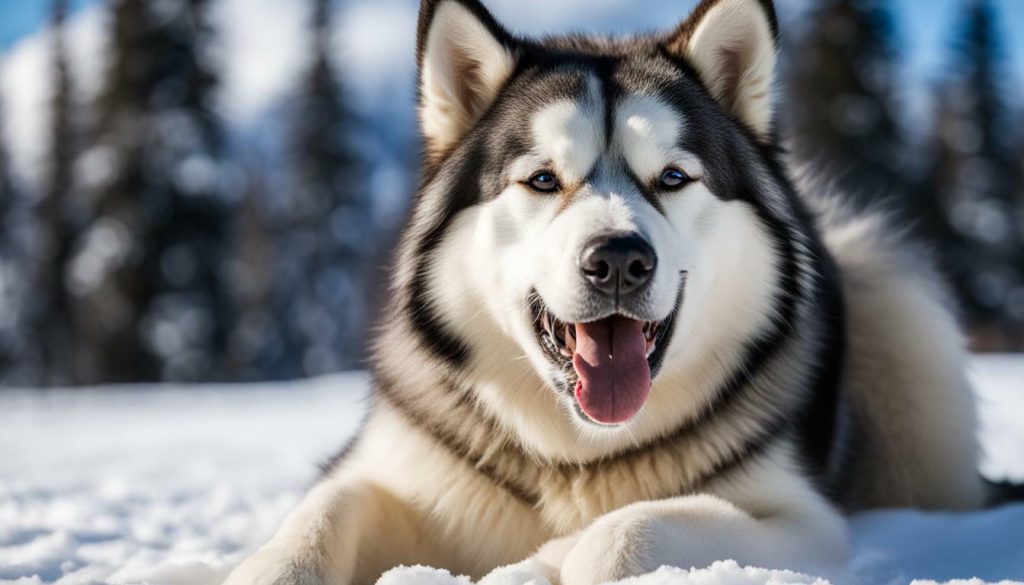
| Benefits of Dental Chews: | Benefits of a High-Quality Diet: |
|---|---|
| Helps remove plaque and tartar buildup | Supports strong teeth and gums |
| Promotes fresh breath | Provides essential nutrients for oral health |
| Offers an enjoyable chewing experience | Reduces the risk of dental issues |
Other Considerations for Alaskan Malamutes’ Health
In addition to dental care, it’s crucial to be aware of other health considerations that may affect your Alaskan Malamute. These majestic dogs are known for their strength and endurance, but they are also prone to certain genetic predispositions and health conditions. Being informed about these potential issues can help you take proactive measures to ensure the well-being of your furry friend.
Hip dysplasia: Alaskan Malamutes are susceptible to hip dysplasia, a condition where the hip joint doesn’t develop properly. This can cause discomfort, lameness, and difficulty in mobility. Regular exercise on soft surfaces and maintaining a healthy weight can help reduce the risk.
| Genetic Conditions | Risk Factors | Prevention |
|---|---|---|
| Hip dysplasia | Genetic predisposition | Regular exercise on soft surfaces, maintaining a healthy weight |
| Dwarfism | Genetic predisposition | Regular veterinary check-ups, proper nutrition |
| Bloat | Deep-chested breeds, large meals, rapid eating | Feeding smaller, frequent meals, using elevated bowls |
| Peripheral neuropathy | Genetic predisposition | Regular veterinary check-ups, supportive care |
| Thyroid problems | Genetic predisposition | Regular veterinary check-ups, proper thyroid hormone levels |
| Eye problems | Genetic predisposition | Regular veterinary eye exams, early detection and treatment |
Dwarfism: Another genetic condition that Alaskan Malamutes can be prone to is dwarfism. This can lead to skeletal abnormalities that may affect their overall mobility. Regular veterinary check-ups and providing a balanced diet can support their bone and joint health.
Did you know? Alaskan Malamutes have been used as sled dogs for centuries and are known for their endurance and strength in cold climates.
Bloat: Alaskan Malamutes, like many deep-chested breeds, are at a higher risk of developing bloat. This is a potentially life-threatening condition where the stomach fills with gas and twists. Feeding smaller, frequent meals and using elevated bowls can help reduce the risk of bloat.
Peripheral neuropathy: Some Alaskan Malamutes may also be prone to peripheral neuropathy, a condition that affects the nerves in the legs. Regular veterinary check-ups and providing supportive care can help manage this condition and improve their quality of life.
Thyroid problems: Alaskan Malamutes may have a genetic predisposition to thyroid problems, which can impact their overall health. Regular veterinary check-ups and monitoring of thyroid hormone levels can help ensure early detection and proper management of any thyroid issues.
Eye problems: Alaskan Malamutes are also prone to certain eye problems, including conditions like cataracts and progressive retinal atrophy. Regular veterinary eye exams and early detection can help preserve their vision and provide appropriate treatment if needed.
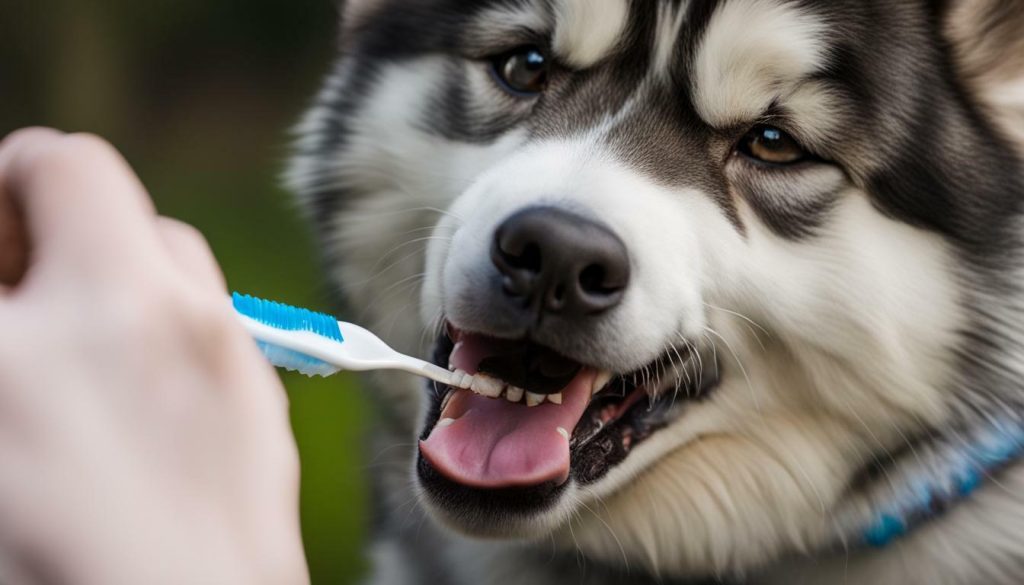
By being aware of these genetic predispositions and potential health issues, you can take the necessary steps to provide your Alaskan Malamute with the care they need. Regular veterinary check-ups, appropriate exercise, a balanced diet, and early detection of any problems can contribute to a healthy and happy life for your beloved companion.
Alaskan Malamutes’ Activity and Socialization Needs
Alaskan Malamutes have specific activity and socialization needs that should be taken into account for their overall happiness and fulfillment. Being a highly energetic breed, Malamutes require regular exercise to keep them physically fit and mentally stimulated. Daily walks, jogs, or playtime in a spacious yard are essential for meeting their activity requirements. Engaging in activities like hiking or participating in dog sports can also provide a healthy outlet for their energy.
Socialization is equally important for Alaskan Malamutes. Early socialization introduces them to various people, animals, and environments, helping them develop into well-rounded and confident dogs. Exposing them to different situations and experiences from a young age can prevent fearfulness or aggression later in life. Interaction with other dogs through supervised playdates or obedience classes can enhance their social skills and promote positive behavior.
“Providing opportunities for your Malamute to play and interact with other dogs is an important aspect of their socialization journey. This will not only help them develop good canine social skills but also provide mental stimulation and prevent boredom.”
Remember that Alaskan Malamutes thrive on human companionship and can become unhappy or destructive if left alone for extended periods. Regular interaction, including training sessions and quality time spent together, can strengthen the bond between you and your Malamute. They are known to be affectionate and playful, making them great family pets when given proper attention and care.
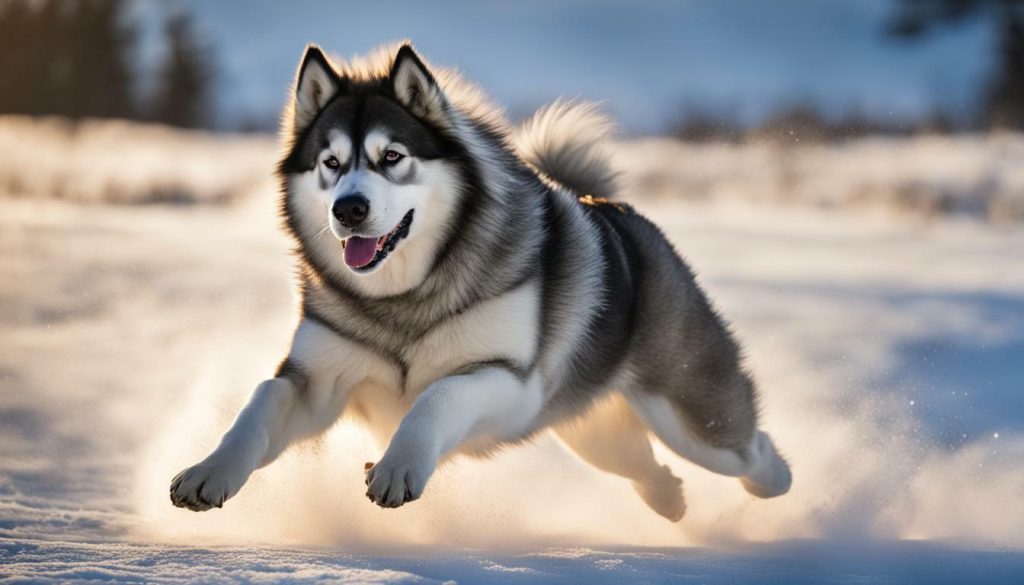
| Key Points: |
|---|
| Alaskan Malamutes require regular exercise to stay physically fit and mentally stimulated. |
| Early socialization is crucial to prevent fearfulness or aggression. |
| Interaction with other dogs can enhance their social skills. |
| Alaskan Malamutes thrive on human companionship. |
The Importance of Early Dental Care for Alaskan Malamutes
Establishing good dental care habits from an early age is crucial for the long-term dental health of your Alaskan Malamute. These majestic dogs are more prone to dental issues, making regular teeth cleanings and oral hygiene practices essential. By starting a dental care routine early and being consistent, you can prevent serious diseases like periodontal disease and identify potential problems such as cracked molars or objects lodged in their teeth. Not only does this help maintain their overall health, but it can also save you from costly dental procedures down the line.
When it comes to cleaning your Malamute’s teeth, using the right tools is important. Invest in a dog-specific toothbrush and toothpaste, as human products can be harmful to dogs. Brush their teeth daily if possible, or as often as you can manage, to maintain optimal oral hygiene. Additionally, incorporating dental treats into their diet can help reduce plaque buildup and freshen their breath.
While regular at-home teeth cleanings are crucial, professional dental cleanings may be necessary for optimal oral health. Consult your veterinarian about when to schedule these cleanings, as they can provide a more thorough cleaning and identify any underlying dental issues that may require treatment.

Good dental care is just one aspect of overall health for your Alaskan Malamute. It’s also important to consider their activity and socialization needs. These energetic dogs require regular exercise to keep them happy and healthy. Additionally, being well-socialized from a young age helps prevent behavioral issues and promotes their mental well-being.
Lastly, it’s crucial to be aware of the genetic predispositions that Alaskan Malamutes may have for certain health conditions. These include hip dysplasia, dwarfism, bloat, peripheral neuropathy, thyroid problems, and eye problems. Regular veterinary check-ups and monitoring for any signs or symptoms of these conditions are vital in maintaining your Malamute’s overall health and well-being.
| Section Summary |
|---|
| Establishing good dental care habits from an early age is crucial for the long-term dental health of your Alaskan Malamute. Regular teeth cleanings and oral hygiene practices can help prevent serious diseases and identify potential dental problems. |
| Use dog-specific toothbrushes and toothpaste to clean your Malamute’s teeth daily or as often as possible. Incorporating dental treats into their diet can also contribute to oral health. |
| Professional dental cleanings may be necessary for optimal oral health. Consult your veterinarian for guidance on when to schedule these cleanings. |
| Consider your Malamute’s activity and socialization needs, as well as their genetic predispositions for certain health conditions, such as hip dysplasia, dwarfism, bloat, peripheral neuropathy, thyroid problems, and eye problems. |
Identifying and Addressing Dental Problems
Regular teeth cleanings can help identify and address potential dental problems in your Alaskan Malamute. By incorporating routine cleanings into your pet’s oral hygiene regimen, you can stay vigilant and catch any issues early on. One common problem that may arise is cracked molars, which can be painful for your furry friend and potentially lead to infection. During a cleaning, your veterinarian will carefully examine your Malamute’s teeth for any signs of damage or fractures.
Another issue that cleanings can help with is toys getting stuck in your Malamute’s teeth. Dogs love to chew on various toys and objects, and sometimes a piece can become lodged between their teeth. Regular cleanings allow the veterinarian to thoroughly inspect your pet’s mouth and remove any debris or foreign objects that may have become trapped. This not only prevents discomfort but also reduces the risk of infection or other oral health complications.
It is important to remember that dental problems in Alaskan Malamutes can progress quickly if left untreated. That is why routine cleanings are essential in maintaining your pet’s overall dental health. If your Malamute shows signs of discomfort while eating or chewing, exhibits bad breath, or displays any other unusual behavior, it is crucial to schedule a dental examination promptly. Early detection and timely treatment can help prevent further complications and ensure your furry companion’s well-being.
| Benefits of Regular Teeth Cleanings for Alaskan Malamutes: |
|---|
| 1. Early identification of dental issues: Regular cleanings allow for the early detection of problems such as cracked molars or toys stuck in teeth. |
| 2. Preventing infections: By addressing dental issues promptly, you can prevent infections and more serious oral health complications. |
| 3. Maintaining oral hygiene: Regular cleanings contribute to overall oral hygiene, reducing the risk of periodontal disease and other dental problems. |
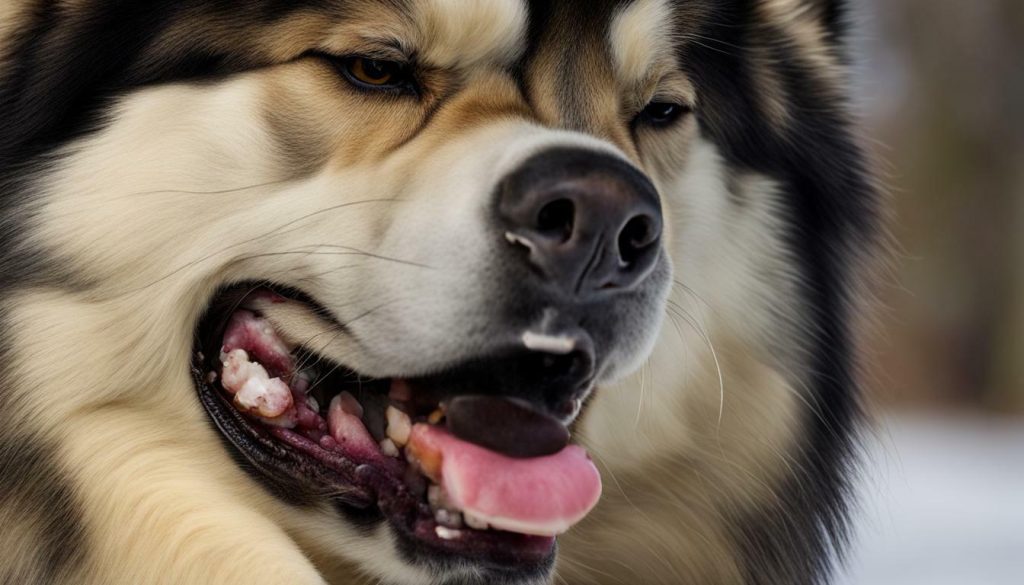
Regular teeth cleanings are a vital part of caring for your Alaskan Malamute’s dental health. They not only help maintain oral hygiene but also play a crucial role in identifying and addressing potential dental problems, such as cracked molars and objects trapped between their teeth. By staying proactive and taking your Malamute for routine dental examinations, you can ensure their overall well-being and prevent more serious dental complications from arising.
Conclusion
Regular dental care is vital for maintaining the oral health of your Alaskan Malamute and keeping them happy and healthy. Malamutes are prone to dental issues, such as periodontal disease, which can lead to serious complications if left untreated. By starting a teeth cleaning routine early and keeping up with regular cleanings, you can prevent dental problems and identify any issues, like cracked molars or toys stuck in teeth, before they become more severe.
To clean your Malamute’s teeth effectively, it’s important to use the right tools. Invest in a dog toothbrush and toothpaste specifically designed for dogs, as human products can be harmful to your furry friend. Aim to brush their teeth daily or as often as possible to maintain good oral hygiene. Incorporating dental treats into their diet can also help promote healthy teeth and gums.
While regular at-home cleanings are crucial, professional dental cleanings should also be considered. A professional cleaning can reach areas that are difficult to clean at home and help prevent the buildup of plaque and tartar. Discuss with your veterinarian how often your Malamute should undergo a professional dental cleaning based on their individual needs.
In addition to dental care, it’s important to consider other aspects of your Malamute’s health. Provide them with dental chews and a high-quality diet to support their oral health. Keep their activity and socialization needs in mind to ensure their overall well-being. It’s also essential to be aware of the common genetic predispositions and potential health issues that Alaskan Malamutes may face, such as hip dysplasia, dwarfism, bloat, peripheral neuropathy, thyroid problems, and eye problems. Regular check-ups with your veterinarian can help identify and address any potential health concerns early on.
FAQ
Q: Why is it important to clean an Alaskan Malamute’s teeth?
A: Cleaning an Alaskan Malamute’s teeth is important for their dental health. They are prone to dental issues, and dental problems can lead to serious diseases such as periodontal disease. Regular cleanings can also help identify other problems such as cracked molars or toys stuck in teeth. Additionally, it can help prevent costly dental procedures.
Q: How often should I clean my Malamute’s teeth?
A: It is recommended to brush your Malamute’s teeth daily or as often as possible. The more frequently you clean their teeth, the better their dental health will be.
Q: What tools do I need to clean my Malamute’s teeth?
A: You will need a dog toothbrush and toothpaste specifically designed for dogs. These tools are essential for effective teeth cleaning.
Q: How do I clean my Malamute’s teeth?
A: Start a teeth cleaning routine early by introducing the toothbrush and toothpaste gradually. Brush their teeth daily using gentle circular motions. You can also incorporate dental treats into their diet to promote oral health.
Q: Should I consider professional dental cleaning for my Malamute?
A: Professional dental cleaning may be necessary in some cases. Consult with your veterinarian to determine if your Malamute would benefit from professional cleaning.
Q: How can I maintain my Malamute’s oral health?
A: Besides regular teeth cleaning, you can provide dental chews and feed them a high-quality diet. These measures can help maintain your Malamute’s oral health.
Q: What other health considerations should I be aware of for my Malamute?
A: Alaskan Malamutes may have genetic predispositions for conditions such as hip dysplasia, dwarfism, bloat, peripheral neuropathy, thyroid problems, and eye problems. Regular veterinary check-ups and proper care can help address these potential health issues.
